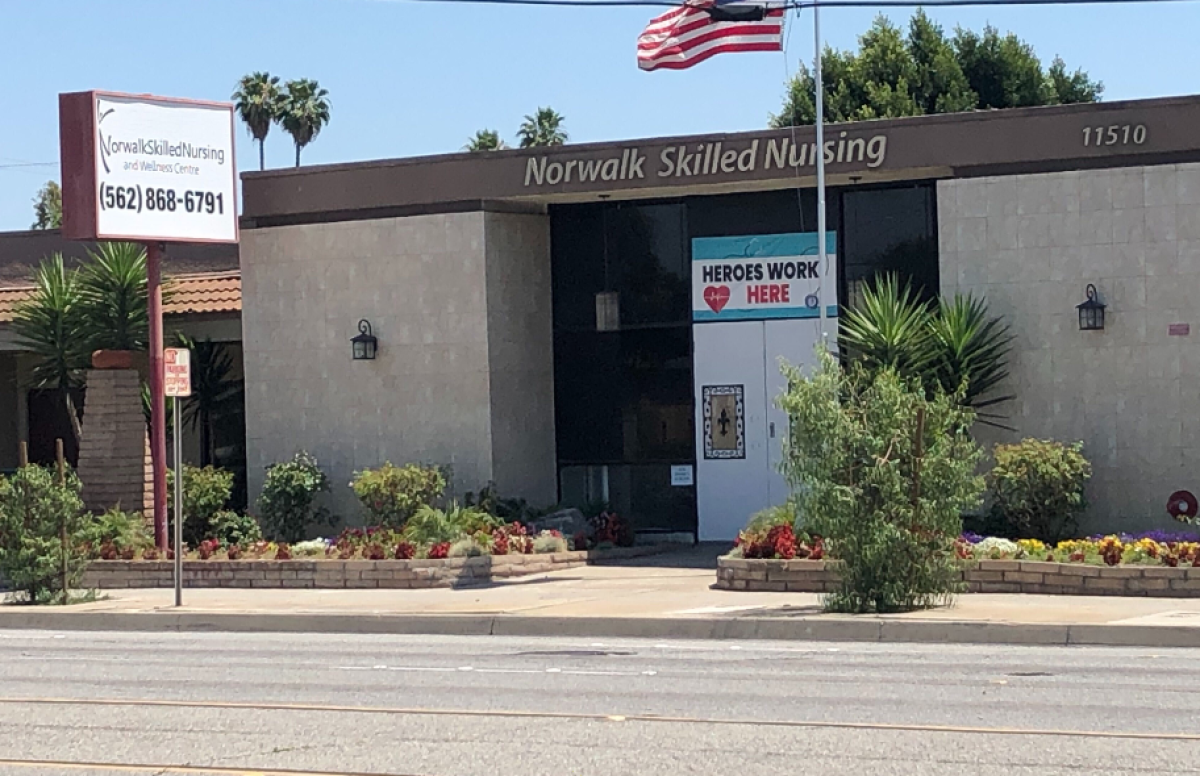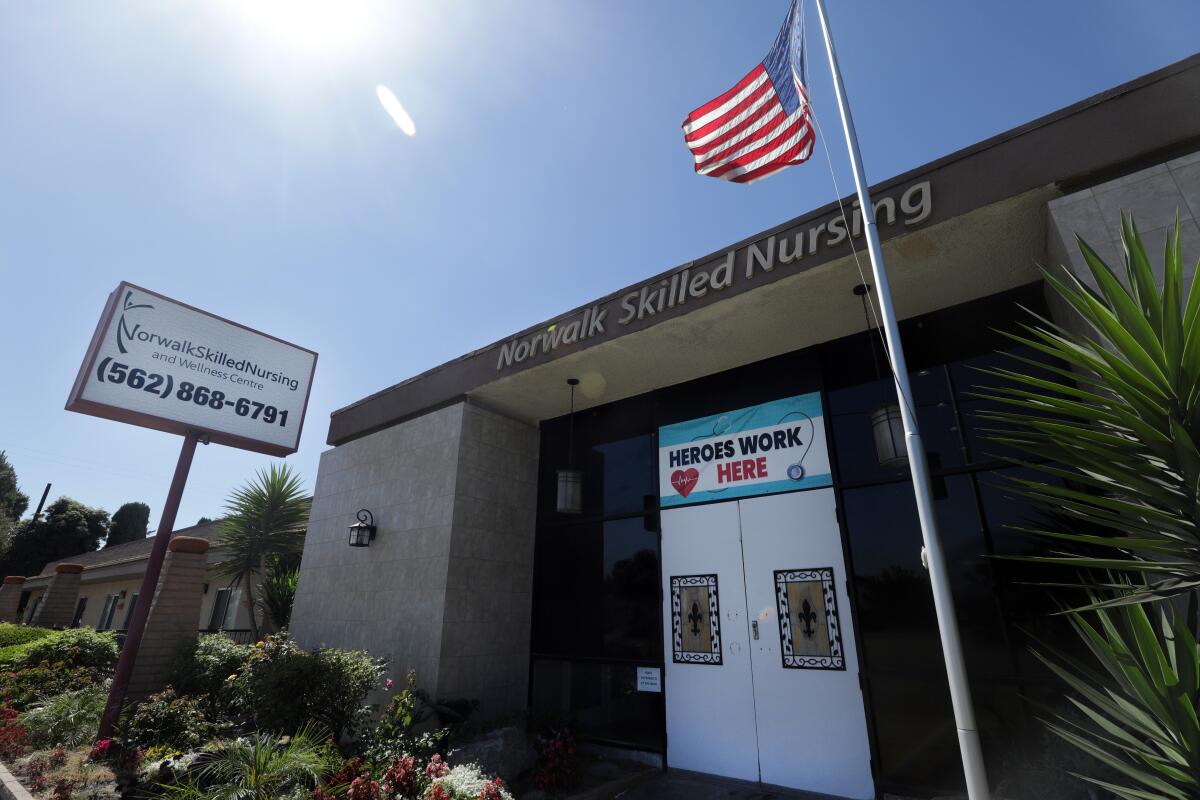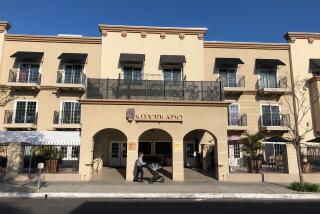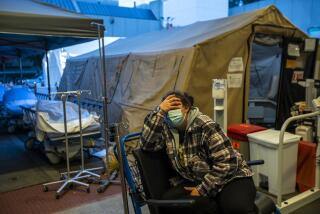‘Massive outbreak’ swept through nursing home as coronavirus testing lagged

- Share via
When Budgie Amparo’s mom needed a nursing home, he was in a unique position to help. As a nurse in charge of quality control for a chain of such facilities, he picked the Norwalk Skilled Nursing & Wellness Center, a home with the highest quality rating from Medicare.
So he was shocked to learn, in mid-May, that the home had a resident with COVID-19 and that administrators did not begin testing staff — the most likely spreaders of the virus within facilities — until more than a week later. So far, at least 42 residents and 32 employees have tested positive, Los Angeles County data show. At least six have died.
The situation underscores how quickly the coronavirus can spread in skilled nursing homes and how essential early, widespread testing is.
“The lag time was way too long,” Amparo said. “Now they have this massive outbreak.”
Dr. David Silver, CEO of Rockport Healthcare Services, the company that oversees Norwalk Skilled Nursing and more than 70 other homes in California, acknowledged that it took “a little more than a week” to test staff after the first resident turned up positive. Asked if testing sooner would have limited the outbreak, he said, “I won’t dispute that.”
Since the beginning of the coronavirus crisis, elderly nursing home residents, who are by far the most at risk, have suffered a devastating toll. As of Tuesday, COVID-19 had killed more than 2,000 residents and 64 employees of skilled nursing facilities in California.
Despite a recent uptick in cases as the California economy begins to reopen, the virus appears to be under control in hospitals and other healthcare settings. But nursing homes like the one in Norwalk, which managed to keep the bug at bay for months, are still suffering outbreaks.
Most health officials say frequent testing of staff is the best way to protect residents and slow the spread, but they have struggled to bring it about.
County health officials, recognizing the threat posed by healthcare workers who frequently work at more than one home and may be infected but asymptomatic, vowed in late April to test residents and staff at all of the county’s nearly 400 skilled nursing facilities. A month later, The Times found, they had managed to finish the job at only about a third of them. As of Sunday, there were still 71 that had not tested everyone.

State health officials have also promised to test everyone at nursing homes, but implementation remains scattershot, with no clear rules about how the testing plan will work or who will pay.
At the end of May, Norwalk Skilled Nursing, a single-story building occupying about a city block on Imperial Highway, was among the homes county health officials had not gotten around to testing yet.
More than half a dozen employees, who spoke with Times reporters on the condition of anonymity for fear of retaliation, said the facility has suffered from a severe shortage of personal protective equipment and has allowed nurse aides to move back and forth between the “dirty” isolation unit meant to contain infected residents and the “clean” unit meant for those who weren’t sick yet. The home also faced the threat of a mass walkout by a scared, exhausted staff unless they start getting hazard pay, the employees said.
“It’s chaos,” said a certified nursing assistant. “The patients are getting infected, the employees are getting infected.”
As the number of infected residents climbed last month, several nursing assistants said they pleaded with the administration to start testing staff but that their bosses instead waited for the health department to provide test kits, which cost an estimated $150 each.
Some employees who had been working with COVID-19 positive residents said they sought out tests on their own after developing symptoms, instead of waiting for the county. One of them suffered chills, exhaustion and a severe headache; the other a fever. Both tests came back positive.
“All they care about is the money they’re bringing in here,” said one of the nursing assistants about her bosses. “We fear for our lives, for our families’ lives.”
Silver, the CEO of Rockport, said his company had been in regular contact with both state and county health officials. When the first positive patient turned up at the Norwalk facility in mid-May, county officials informed him that, “they were the ones who take care of testing,” Silver said.
“They couldn’t do it that day, but they would find a day,” Silver said county officials told him. In the end, it took more than a week for the county to provide the test swabs, Silver said.
County health officials did not respond to a request for comment on the testing delay.
Elena Houmsi, the nurse in charge of quality assurance at the Norwalk facility, was one of several employees who confirmed that healthcare workers have been moving back and forth between the isolation zone with coronavirus infected patients and the rest of the facility where the uninfected residents remain.
“There are times we are short of staff,” Houmsi said. “So that’s what they have to do.”
Silver said he had no knowledge of staff moving between the dirty and clean sides of the building, but acknowledged that would be “against all of our protocols.”
Last week, Rockport suspended the Norwalk facility’s long-serving top administrator as well as Houmsi.
Those suspensions were handed down because the two failed to execute a transfer of about 20 patients with COVID-19 to another Rockport facility, Houmsi said in an interview. Rockport wanted the patients transferred so they wouldn’t have to pay Norwalk nurses extra to care for the infected residents, Houmsi said.
Silver denied that the transfers were proposed to save money. The idea was to send the patients to another Rockport home that has been designated by the county as a COVID-19 positive facility, where they would get, “the highest level of care,” he said.
Those transfers have been put on hold, Silver said.
The Times reported last month that several experts raised questions when L.A. County designated another Rockport home, Country Villa South, as its first COVID-19 positive facility. The idea was to create a landing place for patients leaving hospitals with COVID-19 who had nowhere else to go. Infected residents from other facilities that were trying to limit the spread could also be sent there.
But Country Villa South has the lowest possible Medicare quality rating and a history of failing to follow infection control regulations. Critics, including the former CEO of Rockport, wondered if the company was motivated by the fact that it can charge Medicare nearly four times as much for a COVID-19 patient as it can for a typical resident whose bills are paid by Medi-Cal, the state insurance system for the poor.
Silver denied that the higher reimbursement rate was the motive for seeking the COVID-19 positive designation. He and his company were “doing our part” at a time of unprecedented need, he said.
Since then, the county has designated 21 COVID-positive facilities, including several others managed by Rockport.
Amparo, who worked for Rockport when he put his mother in the Norwalk facility a few years ago, now works for another nursing home chain. But he left his 90-year old mom where she was because it had become her home.
When he discovered what he considered a delay in testing, he said, he reported it to the county health department. He is not sure if they followed up, he said, but he’s more concerned about the failure of Rockport.
“Where is the management company that is supposed to be providing services to a building in crisis, where are they?” he asked.
After filing his complaint, his next move was to pull his mother out of the home. She has tested positive for the coronavirus, but is doing well, he said.
Other families weren’t as fortunate.
Last month, Roma Rathell got a call from facility staff that her 87-year-old mother, Angelina Pascual, had been exposed to the virus after using a bathroom that a COVID positive patient had used. Soon after, Pascual, who had lived in the facility for about four years, tested positive.
“I was hoping that she just needed to be quarantined for 14 days and she’ll be OK,” Rathell said. But after Pascual ran a fever, she was transported to the hospital, where her condition soon deteriorated.
Pascual died on May 26.
Silver declined to comment on her case.
More to Read
Sign up for Essential California
The most important California stories and recommendations in your inbox every morning.
You may occasionally receive promotional content from the Los Angeles Times.













